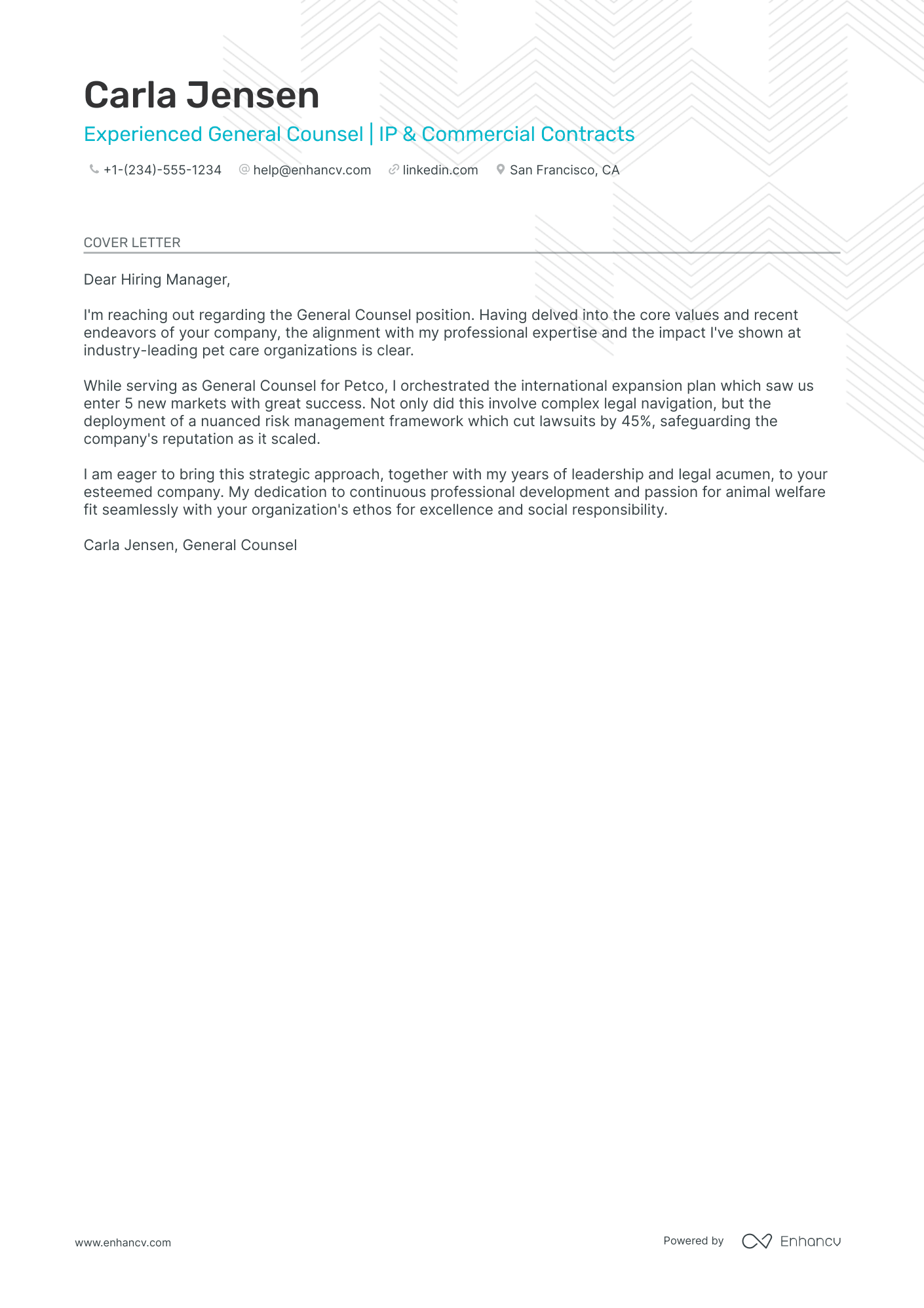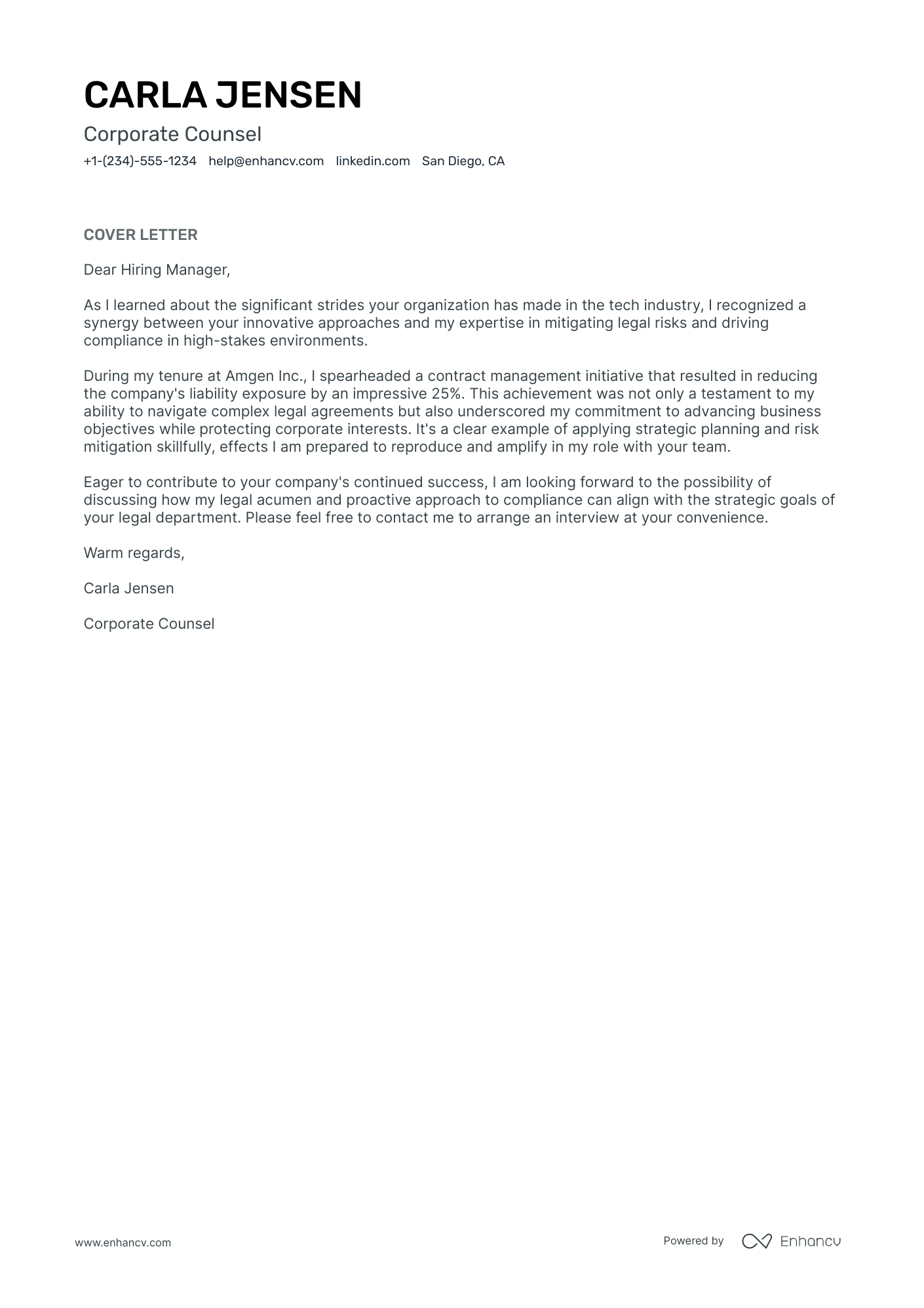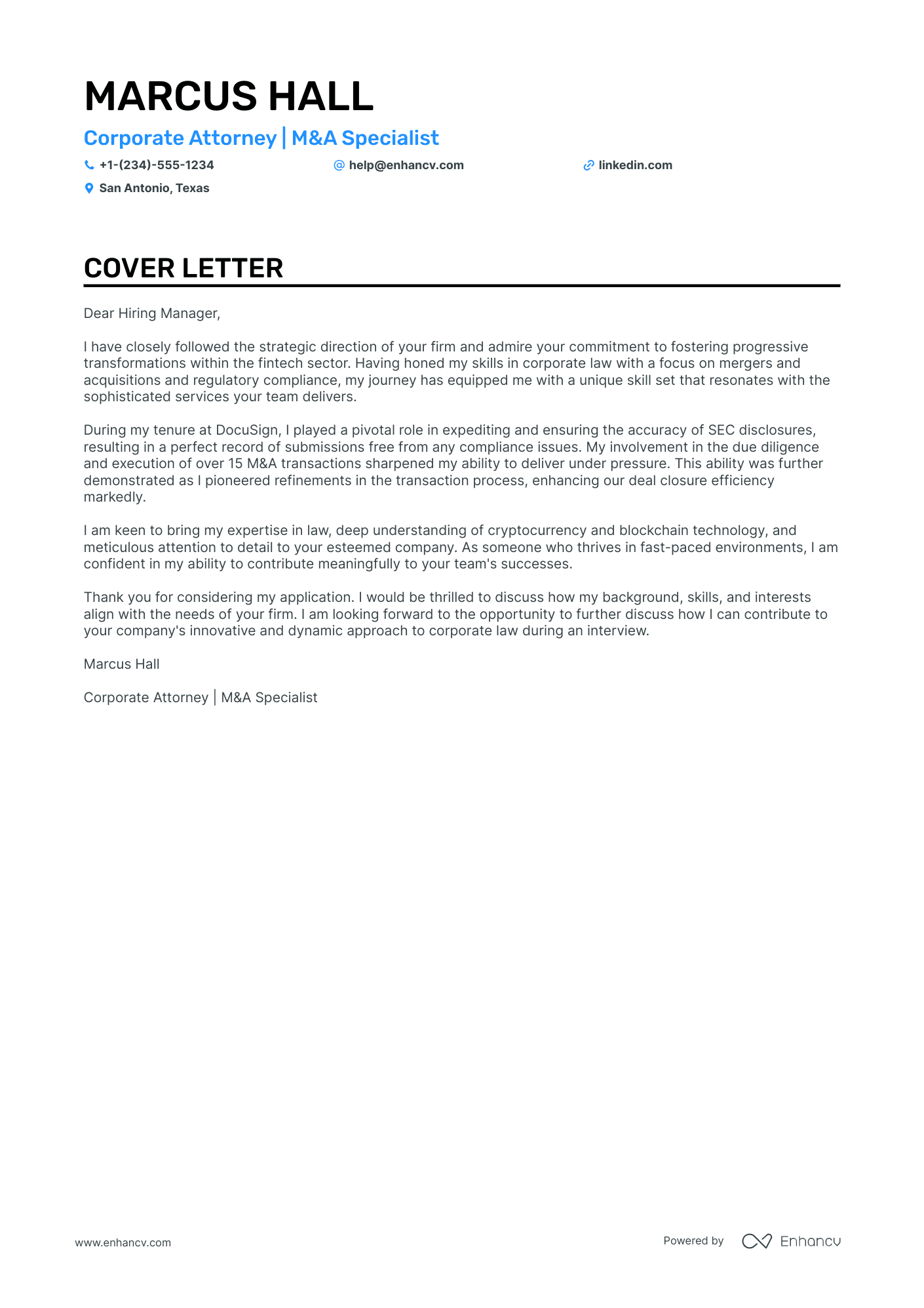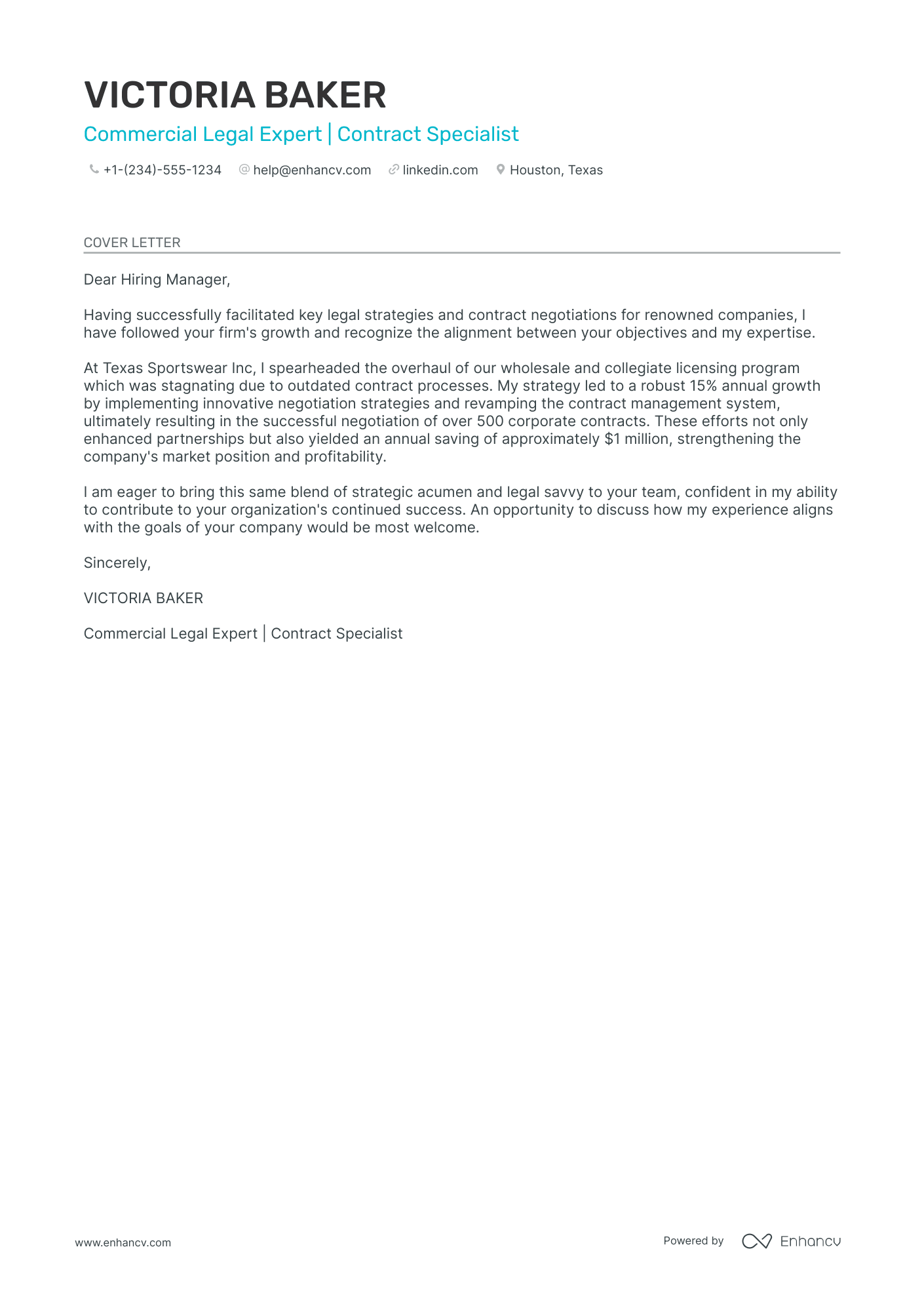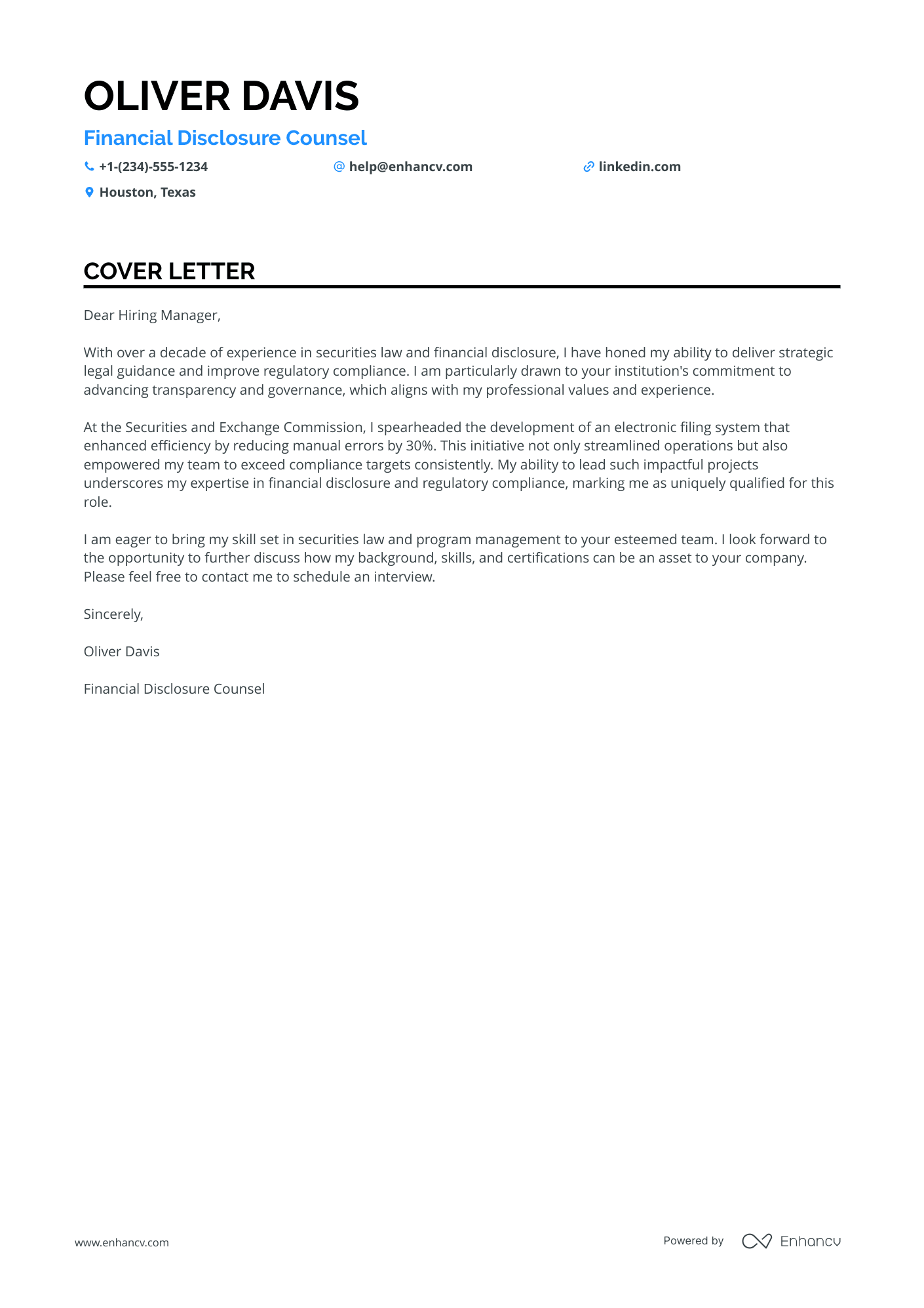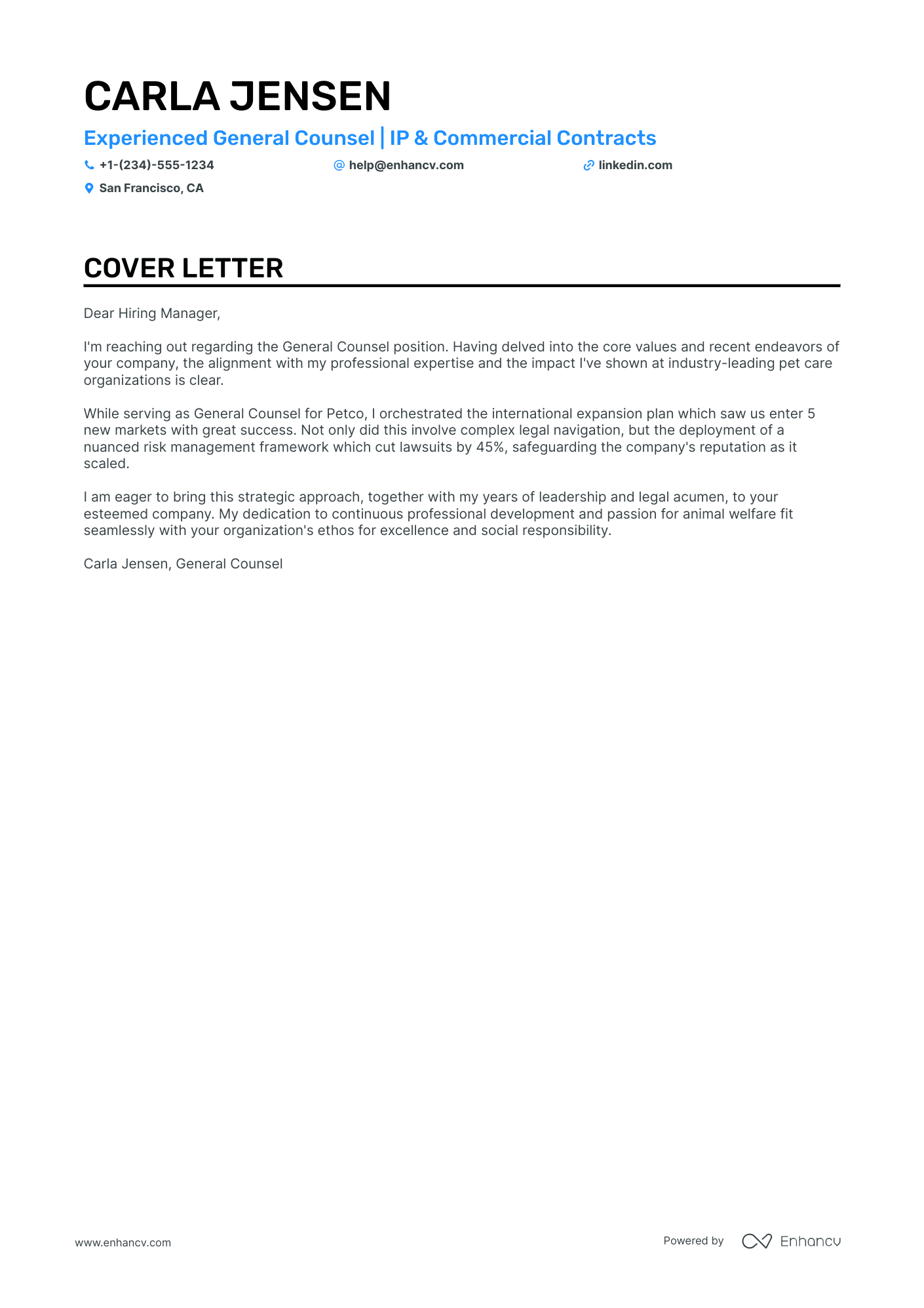Embarking on your job search, you've quickly learned a compelling counsel cover letter is your ticket to standing out. Yet, crafting this one-page pitch is no small feat. It's not about echoing your resume; it’s your chance to weave a narrative around your proudest professional triumph. Stay clear of the clichés and adopt a formal tone that reflects your individuality. Let’s journey through making your cover letter not just informative but memorable.
- Introduce your profile to catch recruiters' attention;
- Use professional templates and examples to make sure your counsel cover letter follows the best industry standards;
- Settle on your most story-worthy achievement to shine a light on what makes your application unique;
- Write a counsel cover letter, even when you lack professional experience.
Ready to start with the basics: upload your resume to Enhancv's AI, below, to see the counsel cover letter it would write for you.
If the counsel isn't exactly the one you're looking for we have a plethora of cover letter examples for jobs like this one:
Drop your resume here or choose a file.
PDF & DOCX only. Max 2MB file size.
Counsel cover letter example
OWEN WRIGHT
New York City, New York
+1-(234)-555-1234
help@enhancv.com
- Highlighting specific achievements relevant to the target role – mentioning the initiative that revamped how healthcare regulations were handled showcases the ability to generate impactful results pertinent to healthcare law.
- Demonstrating measurable outcomes – providing quantifiable metrics such as the reduction of legal risks, a 25% expansion of service coverage, and increasing team efficiency by 30%, all of which are significant in illustrating competency and effectiveness.
- Leadership and strategic integration – pointing out leadership in orchestrating legal advisory for M&A transactions indicates a readiness to take on complex tasks and implies a strategic mindset beneficial for a senior legal counsel position.
- Expressing an understanding of the company's objectives – by expressing a desire to contribute to healthcare compliance and legal affairs, the cover letter shows alignment with the company’s goals, making the applicant appear well-suited for the organization’s needs.
The format of your counsel cover letter: structure, fonts, margins, and more
Your counsel cover letter should include a header (with your name, position, and date); a greeting and introductory paragraph; a body and closing paragraphs; and an optional signature.
Remember that you're writing your counsel cover letter for recruiters - as the Applicant Tracker System won't scan this content.
Here are a few more tips and tricks to keep in mind when formatting your counsel cover letter:
- Use the same font in your counsel cover letter and resume. We recommend modern fonts, e.g. Lato and Rubik, to help you stand out, instead of the stereotypical Arial and Times New Roman.
- Each paragraph should have single spacing, which is already set up for you in our cover letter templates.
- Our cover letter builder follows industry standards for your counsel cover letter formatting - with a one-inch margin, surrounding your content.
- Always export your counsel cover letter in PDF to ensure the image or text quality stays the same and your writing isn't moved about.
Pressed for time? Use our free cover letter generator to turn your resume into a cover letter effortlessly.
The top sections on a counsel cover letter
- Header: Includes your contact information, the date, and the employer's details; it is imperative for ensuring your letter reaches the right person and sets a professional tone.
- Greeting: Opens with a formal salutation directed at the hiring manager or relevant party; tailored greetings show you've done research and are serious about the position.
- Introduction: Briefly mentions your current role, highlights your interest in the position, and specifies why you are pursuing a career in law; it serves as a hook to grab the recruiter's attention.
- Body: Outlines your relevant legal experience, key accomplishments, and specific skills that align with the responsibilities of a counsel; this section showcases your suitability and readiness for the role.
- Closing: Reiterates your enthusiasm for the role, mentions your availability for an interview, and includes a thank you note; this section leaves a positive, lasting impression and encourages a call to action.
Key qualities recruiters search for in a candidate’s cover letter
- Strong analytical and research skills: Essential for identifying legal issues, interpreting laws and regulations, and providing accurate legal advice.
- Excellent drafting and communication skills: Necessary for creating clear, persuasive legal documents and effectively communicating with clients, courts, and other attorneys.
- Proven negotiation and conflict-resolution abilities: Critical for representing clients' interests, resolving disputes, and achieving favorable settlements or agreements.
- In-depth knowledge of relevant legal areas: Specialized understanding of specific legal fields pertinent to the company's industry is crucial for providing targeted legal counsel.
- Experience with compliance and regulatory matters: Important for advising organizations on how to operate within the bounds of applicable laws and helping to mitigate legal risks.
- Demonstrated leadership and management capabilities: Beneficial for overseeing legal teams, collaborating with other departments, and providing strategic guidance to leadership or the board of directors.
Personalizing your counsel cover letter salutation
Always aim to address the recruiter from the get-go of your counsel cover letter.
Use:
- the friendly tone (e.g. "Dear Paul" or "Dear Caroline") - if you've previously chatted up with them on social media and are on a first-name basis;
- the formal tone (e.g. "Dear Ms. Gibbs" or "Dear Ms. Swift") - if you haven't had any previous conversation with them and have discovered the name of the recruiter on LinkedIn or the company website;
- the polite tone (e.g. "Dear Hiring Manager" or "Dear HR Team") - at all costs aim to avoid the "To whom it may concern" or "Dear Sir/Madam", as both greetings are very old-school and vague.
List of salutations you can use
- Dear Hiring Manager,
- Dear [Law Firm Name] Team,
- Dear [specific name if known, e.g., Mr./Ms. Smith],
- Dear Members of the [Department Name] Department,
- Esteemed Colleagues,
- Respected [Job Title or Selection Committee],
Introducing your profile to catch recruiters' attention in no more than two sentences
The introduction of your counsel cover letter is a whole Catch 22 .
You have an allocated space of no more than just a paragraph (of up to two sentences). With your introduction, you have to stand out and show why you're the best candidate out there.
Set out on a journey with your counsel cover letter by focusing on why you're passionate about the job. Match your personal skills and interests to the role.
Another option for your counsel cover letter introduction is to show you're the ideal candidate. Write about how your achievements and skills are precisely what the company is looking for.
However you decide to start your counsel cover letter, always remember to write about the value you'd bring about. Making it both tangible (with your metrics of success) and highly sought out.
The middle or body of your counsel cover letter body: a great instrument to tell a story
Now that you've set the right tone with the greeting and introduction of your counsel cover letter, it's time to get down to business.
Hear us out, the body of your counsel cover letter is the best storytelling instrument you have, in your job-hunting arsenal.
Writing the next three to six paragraphs, take the time to reassess the advert to discover job-crucial requirements.
Next, choose one accomplishment that covers those key skills and talents.
Use precisely that achievement to tell an exciting story of how you match the ideal candidate profile.
In the undertones of your story or counsel cover letter body, hint at the difference you'd make and sell your application as the perfect one for the job.
Closing remarks to end your counsel cover letter
Of course, you'll have to show gratitude to the recruiters, who have assessed your profile at the end of your counsel cover letter .
A "Thank you for the consideration" would work wonders, instead of the standard "Sincerely yours".
Do you want to make an even better impression?
Close off your counsel cover letter by promising how you see yourself excelling in the role and the positive impact you'd bring about.
A sentence that encourages some further action on the recruiter's end could also be a good way to close off the communication (e.g. provide your availability for an interview).
Keep this in mind when writing your zero experience counsel cover letter
Even though you may not have any professional experience, your counsel cover letter should focus on your value.
As a candidate for the particular role, what sort of skills do you bring about? Perhaps you're an apt leader and communicator, or have the ability to analyze situations from different perspectives.
Select one key achievement from your life, outside work, and narrate a story that sells your abilities in the best light.
If you really can't think of any relevant success, you could also paint the picture of how you see your professional future developing in the next five years, as part of the company.
Key takeaways
Winning at your job application game starts with a clear and concise counsel cover letter that:
- Has single-spaced paragraphs, is wrapped in a one-inch margin, and uses the same font as the counsel resume;
- Is personalized to the recruiter (using their name in the greeting) and the role (focusing on your one key achievement that answers job requirements);
- Includes an introduction that helps you stand out and show what value you'd bring to the company;
- Substitutes your lack of experience with an outside-of-work success, that has taught you valuable skills;
- Ends with a call for follow-up or hints at how you'd improve the organization, team, or role.
Counsel cover letter examples
By Role
General Counsel
In House Counsel
Corporate Counsel
Legal Counsel
Financial Counsel
- Alignment with Organization's Values: The candidate highlights their own professional values and commitment to transparency and governance, aligning with the organization's mission. This demonstrates an understanding of the company culture and showcases a shared vision.
- Emphasis on Relevant Experience: By mentioning over a decade of experience and specific achievements, such as leading the development of an electronic filing system, the candidate illustrates their expertise in securities law and program management, which are crucial for the role.
- Quantifiable Achievements: Including measurable outcomes, like reducing manual errors by 30%, provides concrete evidence of the candidate's capabilities and success in improving efficiency and compliance, making their accomplishments more tangible and impactful.
- Invitation for Further Discussion: The letter concludes with an eagerness to discuss the candidate's potential contributions, inviting engagement and demonstrating enthusiasm for the prospective role while providing contact information for follow-up.
